Women in Business Q&A: Kristi Soomer of Encircled Clothing
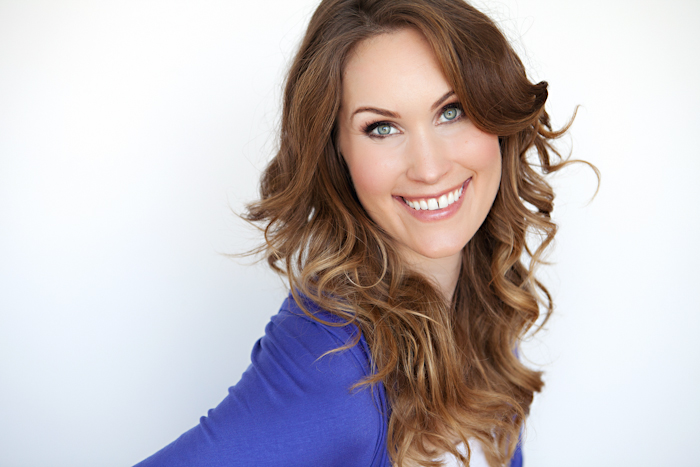
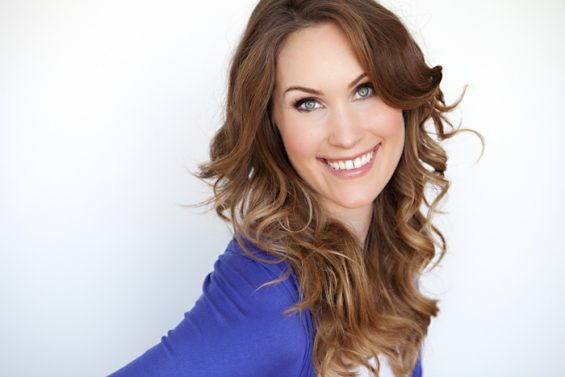

Anyone who travels frequently and wants to maintain some semblance of style knows how challenging it is to pack without a) grossly overpacking or b) dreading opening your suitcase to the same five or six items you’ve already worn to death. Enter Encircled, a collection of uniquely versatile everyday wardrobe essentials and multiway travel clothing, founded by Torontonian Kristi Soomer.
I met Kristi at the Women in Travel Summit, where she was showcasing some of her Encircled clothing favorites. Not only is she a whip-smart businessperson—as well as incredibly good-natured with content marketers who grope her products repeatedly (it’s not my fault—the fabrics feel incredible)—but she’s also an advocate of ethical fashion and minimalism. A surfer and a travel nut, Kristi wants to spread the good word about the perspective and richness of experience we gain through travel, while offering women options for ethically made clothing that can be used in a multitude of ways and locations—with nary a zip-off pant leg in sight.
She sat down to talk about how a seminal idea for an eight-in-one travel piece transformed into a burgeoning business that helps women do more with less.
Robin Catalano: What motivated you to start Encircled?
Kristi Soomer: I started Encircled after being frustrated with a lack of versatile travel clothing that was also stylish.
While packing for a last-minute yoga retreat, my suitcase broke. I had to stuff everything into a much smaller bag, and it opened my eyes to the fact that I was bringing way too much stuff.
I had a circle scarf packed, and I started to wonder, what if this was made out of better fabric? What if you could turn this into a cardigan and a dress? What if it would stay in the ways to wear without pinning or tying?
And that became my first product, the Chrysalis Cardi [below], an eight-in-one travel piece made from beautiful fabric, with hidden strategically placed snaps to help the garment transform into various looks effortlessly. Instead of looking like a scarf tied into a dress, it actually looks like what it’s supposed to be, which in my opinion, is the maximum in versatility.
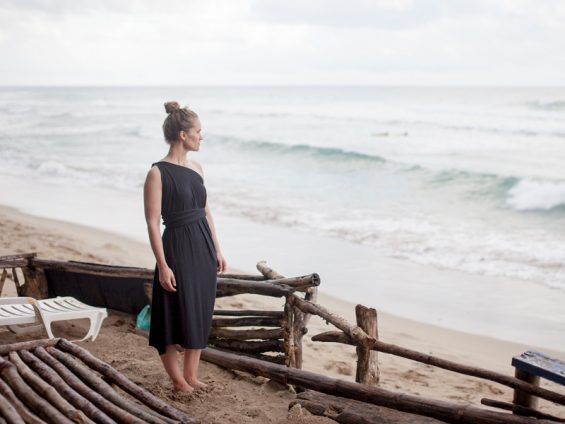
RC: Describe your “a-ha” moment where you thought, “I can make a business out of this.”
KS: For me, it all started with the product idea. Right away, I knew I was onto something. Everyone I showed it to thought it was pretty cool. I did a lot of up-front research, as well, to see if anyone else was doing something similar, and they weren’t. At that moment, I knew it was either a really good idea—or the complete opposite—and just decided to pursue it further.
I did start really small—making just the Chrysalis Cardi in one size, two colors, and retailing it online, shipping from my apartment. Our biggest break came when we got a chance placement in the Globe + Mail Holiday Gift section. The sales from that one day were a third of what I did in my first year of business. So I started working on more designs, and started getting the brand more out there.
RC: How did you choose the name Encircled?
KS: The name Encircled was inspired by the first design, the Chrysalis Cardi, which is essentially a circle scarf. It also speaks to the values I wanted to embody in the business: the notion of full-circle fashion. The fashion industry is one of the top polluters in the world, and one of the biggest violators of human rights globally. I wanted to create a clothing company that practiced the idea of full-circle fashion. A company that not only created high-quality, versatile apparel for our customers, but that also did it in a way that honored the environment and respected workers’ rights.
RC: You recently wrote about how you didn’t have fashion experience before you started Encircled. Did you have any doubts/fears about leaping into a new industry, and how did you allay them?
KS: It’s true. I had zero fashion experience aside from taking an illustration workshop, a basic sewing workshop at a local sewing studio, and reading books. My background is business—I have a finance degree and an MBA.
As well, I’m the type of person who needs to feel one hundred percent confident on something before proceeding. It took a big mind-set shift to get me moving forward with Encircled. The biggest fear was just not knowing what I didn’t know. I was so new to the industry that I actually didn’t even know what issues or roadblocks I’d run into.
Ultimately, it was the wise words of the inspiring business guru Marie Forleo that got me going. She says, “Everything is figure-outable.” And it’s true—you can, especially in this time of connectivity of the internet, figure it out. Following her, and joining entrepreneur communities online, truly gave me the boost of confidence I needed.
RC: Tell us about the different types of products you offer. What makes Encircled clothing different from mass-market clothes or even other travel clothing?
KS: Encircled focuses on two design principles: transformative apparel and everyday essentials. Our transformative apparel literally changes shape or form to become something else, thereby offering maximum versatility in your closet (or suitcase). This is different than most apparel, as you get more wear out of your piece, as it does more for you! For example, our Revolve Dress [below] is reversible, so you can wear the drape in the front or the back—so you get two neckline options—and it also changes length so you can style it as a dress, top, or tunic.
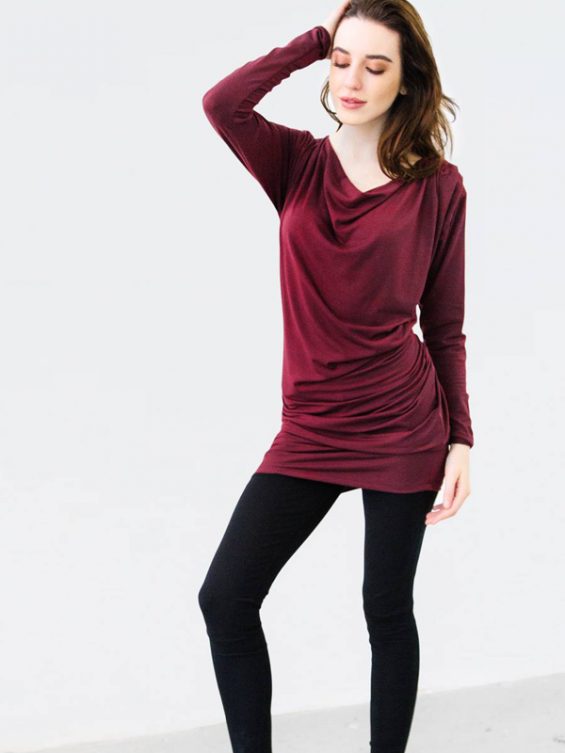
The travel clothing that is out there is often made with a focus on functionality and not necessarily style. We blend the two. We want women to be able to travel freely with our clothes, and also bring them into their everyday wardrobe at home.
Our everyday-essentials focus on impeccable fit, high-quality fabrics, and great construction. Most clothing nowadays, especially mass-market clothing, doesn’t focus on one of these aspects, let alone all three. We believe strongly in quality over quantity. For example, investing in a really well-made, perfectly fitted white V-neck that will last wash after wash is better than buying a new one every season that just falls apart. Many of our everyday essentials are also dress up/dress down, so they can take you from day to night, like our Dressy Sweatpants [below].
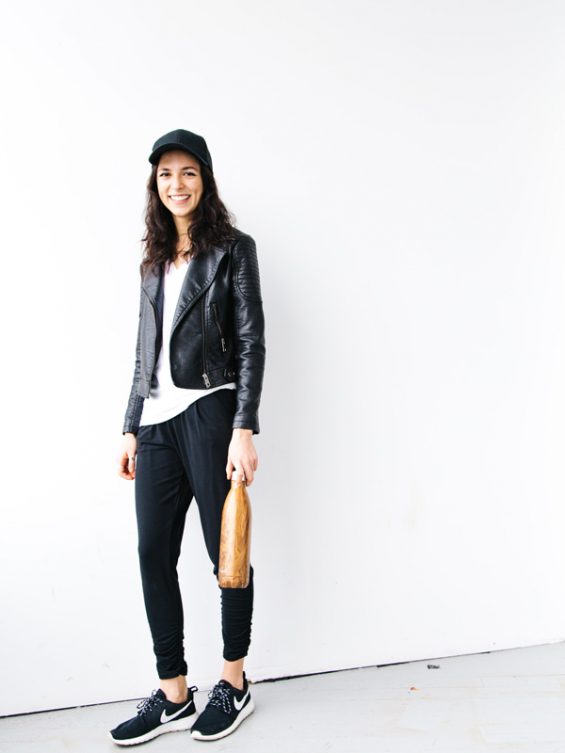
RC: Why did you decide to become a B Corp?
KS: We pursued a B Corp certification mainly because of the credibility associated with the accreditation. Now that it’s trendy to be “eco” or “ethical,” you’re seeing big brands using these terms. It’s easy to state you’re something, but it’s much more difficult to prove it.
The B Corp certification process also opened us up to a set of best practices in the industry that we can continue to leverage to make our business even better, year after year. We’re definitely in good company at B Corp with companies like Warby Parker, Patagonia, Eileen Fisher, and Ben and Jerry’s on board.
Lastly, it gives consumer confidence in our brand. Encircled is only five years old, and just starting to emerge on the radar of larger competitors. It shows consumers that we are committed to using business as a force for good, and not just through what we do, but also how we do it.
RC: What were the most challenging parts of getting your business off the ground?
KS: In the beginning, the most challenging part was getting everything done; I was working full-time as a management consultant and running Encircled on weekends. Plus, I traveled weekly for my job, so was almost never home. The ability to answer customer service e-mails, do social media posts, package orders, manage production, and create new designs was so messy at the beginning.
Just balancing it all was so hard, but when you have limited funds and cash flow, you have to DIY it from the start. I found it helpful to prioritize my tasks on a daily/weekly basis and focus always on what would grow the business the fastest.
Another big challenge was managing production. While we’re lucky that our sewing factories are all in Toronto, it was still an industry new to me. I was figuring it out as I went. I was very lucky to meet early on amazing production contractors, many of whom we still work with today. Just getting the garments produced was a struggle, especially with a low order size.
RC: What has changed most about the business—or you as a businessperson—since you founded it?
KS: So many things!
Originally, Encircled started with the idea of helping women travel light. We were solely focused on travel clothing. As the years passed, I realized increasingly our customers were wearing our clothing not only on those epic journeys, but also in their everyday life. We rebranded in late 2016 to focus on doing more with less. The idea that you don’t need more clothing in your closet, you need fewer but better pieces that you actually wear and truly love.
We’re also now a team of 11, and now have a studio in Toronto, so no more shipping out of my condo.
As a businessperson, I’ve learned to become more resilient. To be a successful entrepreneur, I believe you need to be able to keep yourself motivated and, most importantly, keep moving forward when things go awry—because there will always be something! There will always be failures. It’s important to learn from them, and recover as quickly as possible and move on.
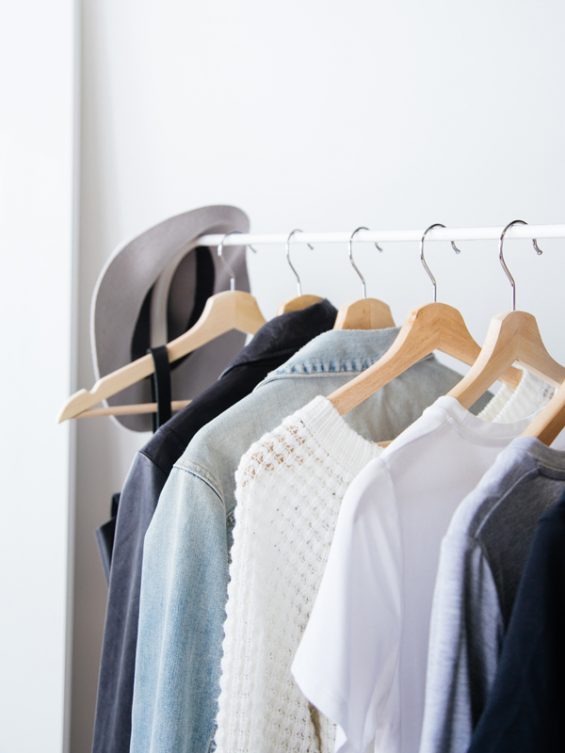
RC: What do you think are your biggest accomplishments in business?
KS: Everything that we’ve achieved so far. We’re building a multimillion-dollar business in an industry where people told me I’d never be able to make ethical production and sustainability work. Though we’re still very small, we’ve got a lot of grit and potential, and I do believe that world is shifting to care more about how their apparel is made and who makes it.
RC: What has surprised you the most about running Encircled, or about people’s reaction to your mission?
KS: Overall, people react very positively to our mission of doing more with less, and building a kinder, better closet. One thing that surprised me the most is the adverse reaction to our pricing. I wish people truly understood more about how expensive it is to make apparel in Canada, and use premium, eco-friendly fabrics like ours.
There’s not a lot of education out there on this, and consumer perceptions are warped from years of fast fashion $10 T-shirts. We try to price ourselves comparatively to brands like Lululemon, Aritzia, and Kit and Ace—all of which don’t make apparel on-shore, and still find price resistance to be the biggest barrier to purchase.
I know this will improve in time as our brand becomes more well-known, but there needs to be more education in this area of why this is important. Documentaries like The True Cost [Netflix] are a good starting point for learning why even a $200 T-shirt made abroad may not have ethical manufacturing. There’s often the perception that the more something costs, the more workers are paid, and that is not always the case.
RC: How many hours do you typically work in a week? Is there any particular task that you love…any that you could do without?
KS: On average, I’m working between 50 and 60 hours a week, which is quite a bit lower from when I first went full-time into the business. I’m not averse to working hard, or long hours. It’s part of the gig. When I was in corporate, I worked similar hours.
I could definitely do without the office-management type stuff. Ordering supplies and fixing printers is not my jam, but you’ve gotta do what needs to be done to keep the business running.
RC: What type of marketing do you do to get the word out about Encircled clothing? Have you found the return on investment to be worth it?
KS: I started the brand by working with influencers and a PR agency. Although the PR agency and I parted ways, I’ve had longstanding relationships with influencers for years. It’s so important to get our designs in the hands of people who would actually wear them in real life. The great thing about influencers is that there is often a clear, measurable return on investment.
Another channel that has been quite successful for us is Facebook advertising. Through that channel, we have the ability to reach someone who may be interested in a brand like ours.
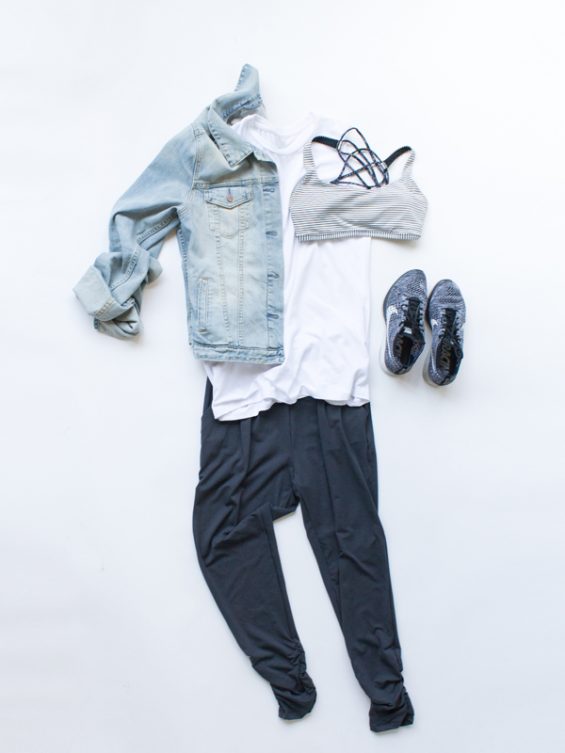
RC: Have you found it beneficial to join any professional networking groups?
KS: This is something I’d like to do more of, as I do think it is important. I just haven’t had the time to do it in person. I am a member of a few online communities, which have been incredibly supportive.
I think it’s pivotal to surround yourself with like-minded people, especially in the beginning. Most of my friends are not entrepreneurs, which means they often can’t relate to the day-to-day challenges of running a business. One of my closest business friends has been a true support system for me as Encircled grows. Even though she runs a totally different business, she’s an entrepreneur, and we often lean on each other to give each other that “tough” advice when we need it, or to just listen when we don’t.
RC: Did you ever have a moment where you thought “This is too hard” or “I’m done with this”? How did you work through it?
KS: Oh, so many times!
I believe it’s key to acknowledge those feelings, and really let yourself feel them. However, it’s important to not let them hold you back or stop you from building your business.
I had a potential deal with an investor that was a “done deal” fall apart last minute, and it was devastating. The feedback they gave me on my business made me feel like it was doomed for failure and was a waste of time. I was so upset. I allowed myself some time to feel upset, and spent time chatting with friends and family. The next day, I came back into work with a new attitude, and kept going on my path and took what I could that was constructive from their feedback.
About six months later, we took on our first round of investment from another investor who was a better fit. No regrets!
RC: What’s the key to staying relevant as consumer tastes and purchasing philosophies change?
KS: It’s essential to stay in touch with your customers to understand their needs. While we also look at trends, we do tend to focus on listening to our existing customers for ideas and inspiration. We’ve got the benefit of being closely connected via social media and e-mail to many of our customers.
It’s also important if you do sense a change, or feedback that may hint that something is changing, to get ahead of it. We constantly read our customer reviews and truly take them to heart, not only in how we deal with customers but also in the design of our products.
RC: How do you creatively recharge?
KS: I’m most inspired after traveling. However, being a founder of a startup has not allowed me as much freedom to travel as of late, so I’ve had to find alternatives to clearing my mind and opening up those creative channels.
For me, getting outside and walking the dog, or doing a workout, or even driving can produce some of my best ideas. I also find it inspiring to spend time around other entrepreneurs, and being at events/workshops with other like-minded people always gets me recharged and ready to go.
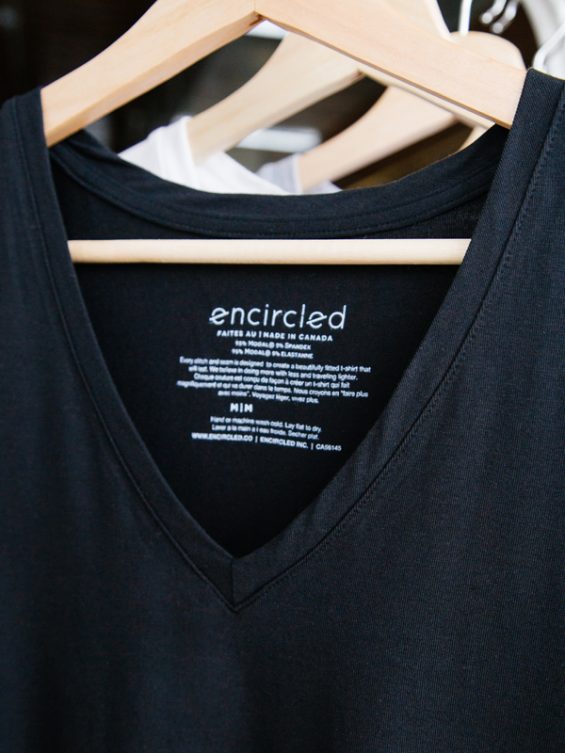
RC: What’s the worst (or least useful) piece of business advice you’ve ever been given, and what’s the best?
KS: The worst business advice I’ve ever been given was actually from one of our competitors’ CEOs early on. I’d met her at an industry networking event and she told me that I needed to go wholesale to make this business a success.
I didn’t want to follow that business model, as I believed strongly that e-commerce was the best way to not only tell our story, but to showcase the versatility of our designs. Our business is now entirely direct to consumer, mostly online, which has been the secret to us being able to offer sustainable and ethical apparel at an accessible price point.
The best business advice I’ve ever been given is from my mentor, Julie Cole, one of the co-founders of the children’s label company Mabel’s Labels. Early on in our mentor-mentee relationship, she told me that it’s as important to define what I will do as much as what I won’t do. As the business started growing, the tendency is to do everything. While this is necessary in the early stages of a startup, it’s not sustainable. You can burn out really quickly. Learning to let go of my don’t-do list has freed up my time to focus on the important aspects of the business as we scale.
That said, there’s always more to be delegated. It’s a work in progress!
Follow Encircled clothing on Facebook, Instagram, and Twitter.